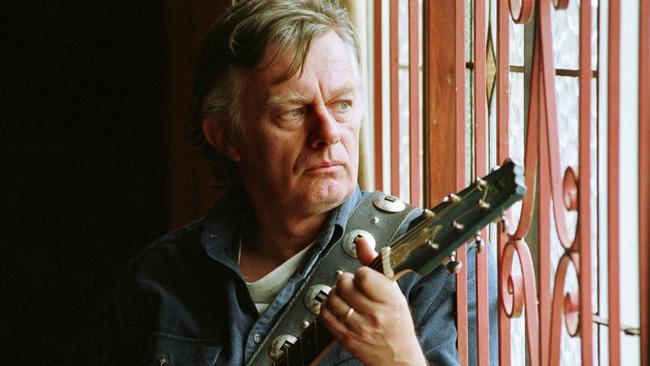Broderick Smith had hits, but he preferred to live by his own music
Acclaimed Dingoes’ singer and musician found memorable musical phrases apparently unavailable to anyone else.

Broderick Smith didn’t love the songs for which he was reluctantly famous as much as we did. Some of which he explained in his 2018 biography, Man Out of Time. In a song of that name he spoke of being weary in a world less trustworthy than that in which he grew up: “When left is in the middle, and right is off the charts.”
Smith grew up in St Albans, an unyielding Melbourne suburb where post-war migrants planted roots in the hope their children’s lives would flower in better parts. Trying to forget the 1940s, they gambled on a peaceful relaunch of interrupted lives here.
They were battlers – a word popularised by Henry Lawson for those who worked doggedly, frequently for little reward. Often that appeared Broderick’s lot. But he’d have described his as a fortunate life, the title of the famous biography of AB Facey, born just down the road.
Smith wanted to learn guitar. His dad baulked at the price, so Smith filled the gap in his life with a harmonica funded by his paper round. Decades earlier it had been Australia’s favourite instrument and dubbed “the band in a waistcoat pocket”.
But as young Australians were swept along by the popular revolutions that followed Elvis Presley and the Beatles, the harmonica became linked to the blues – but still could be found played inexpertly by John Lennon (Love Me Do), Mick Jagger (Midnight Rambler) and everywhere by Bob Dylan.
Young musicians noticed the 1960s rebirth of the blues among white Americans – especially the potent blues harp virtuosi Paul Butterfield, Charlie Musselwhite and Al “Blind Owl” Wilson, whose hits with Canned Heat (Going Up the Country, On the Road Again) were huge here.
By now Smith had joined Kerryn Tolhurst’s Adderley Smith Blues Band, singing and playing blues harp. His playing was melodic and inventive, his voice large and lyrical. Both men were called up for National Service, Smith’s time at the Holsworthy Barracks on the outer edge of Sydney giving him a first taste of the bush.
Back in Melbourne he joined Carson as the focal point of its blues-boogie sound, and they appeared at the first Sunbury festivals. They had hits with the single Boogie and an album, Blown. At Mulwala over Easter 1972, Carson supported Canned Heat. The following year Smith played Tommy’s father in the stage show of The Who’s rock opera alongside bonkers, brandy-soaked Keith Moon.
Tolhurst and Smith formed a band to sing Australian stories – a year before Skyhooks did likewise. The Dingoes was Smith’s idea. The first single, Way Out West, was a slice of country rock brilliance (and defined by Smith’s vocals and harp even though he dismissed the song that was revived in 1992 as a No.2 hit for James Reyne and James Blundell).
Smith wrote the lyrics and probably the music (he couldn’t quite recall) for the next hit, Boy on the Run, which, despite its rustic imagery, was about time down the creek at St Albans.
After almost running out of steam, the Dingoes travelled to America and spent two years of near misses there with help from expatriate road manager Billy McCartney – he made sure Dingoes records were played before what turned out to be Elvis Presley’s last concerts, and they were to have supported the next Lynyrd Skynyrd tour before that band’s plane crash tragedy.
Appropriately, the Band’s Garth Hudson appeared on the album they recorded there, Five Times the Sun; perhaps no Australian band was so modelled on the sound of the Band’s landmark Music From Big Pink.
Despite playing what some may see as purist roots and blues music for the rest of his life, Smith scored another hit with Big Combo’s Faded Roses, and his rendition of Ocean Deep at the Andy Durant Memorial Concert was that legendary show’s inarguable highlight.
While seldom bothering the charts, he could still take you by surprise – a remake of Tomorrow Wendy that Van Morrison would envy, and the haunting The Hunter Blows His Horn from 1984, a moment of vinyl genius now lost to music fans.
The Stones’ Little Red Rooster is the only genuine blues song to top Billboard. Perhaps the only Australian blues chart-topper is Spectrum’s I’ll Be Gone.
On Tuesday at Castlemaine’s Theatre Royal those who loved Smith, those he’d played with, and those of us lucky enough to have seen him over the years, watched Mike Rudd blow his harp and sing: “Someday I’ll have money, money isn’t easy come by … I’ll sing my song and I’ll be gone.”
Broderick Smith. Musician. Born England, February 17, 1948; died Castlemaine, Victoria, April 30, aged 75.




To join the conversation, please log in. Don't have an account? Register
Join the conversation, you are commenting as Logout